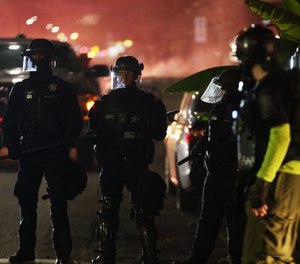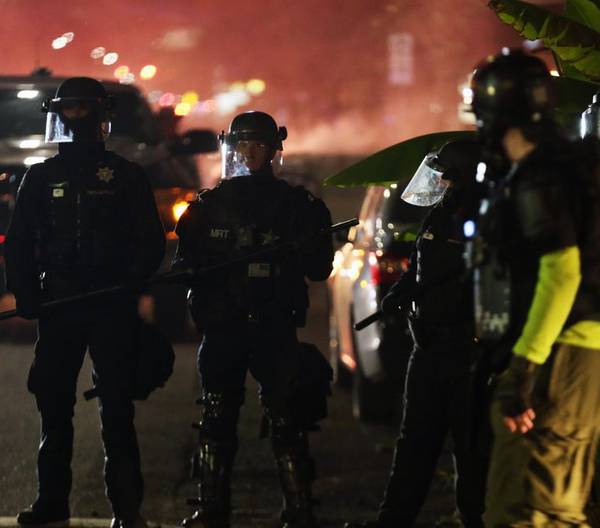PD must abide by a 14-month injunction that requires LEOs to restrict their use of tear gas, less-lethal munitions, pepper spray and long-range acoustic devices
By Maxine Bernstein oregonlive.com Distributed by Tribune Content Agency, LLC
PORTLAND, Ore. — The city of Portland will pay $250,000 to settle a federal lawsuit by the nonprofit Don’t Shoot Portland that challenged the force used by Portland police against protesters in 2020.
The city also has agreed not to use “flash bang” rubber ball distraction devices for crowd control and get rid of its remaining inventory, according to the settlement filed in court Tuesday.

Police also must abide by a 14-month injunction that essentially requires officers to follow bureau policy and state law that restricts their use of tear gas, less-lethal munitions, pepper spray and the bureau’s long-range acoustic devices for crowd control.
U.S. District Judge Marco A. Hernandez will have authority to enforce the injunction for the next year and two months. He has previously found the city in contempt for allowing police to use less-lethal rounds against people who were passively resisting officers, against bureau policy.
The $250,000 payout will be split between five named plaintiffs: Nicholas J. Roberts, Michelle ‘Misha’ Belden, Alexandra Johnson , Lester Wrecksie and Thomas Dreier, with one penny set aside for Don’t Shoot Portland, a Black-led nonprofit that advocates for social and racial justice in the city. Roberts and Belden were both caught in tear gas during protests in downtown Portland, according to the nonprofit’s suit.
The settlement comes more than two years after Don’t Shoot Portland filed its suit against the city amid nightly protests in the wake of the May 25, 2020 death of George Floyd, a Black man who was killed by a Minneapolis police officer who knelt on his neck for more than nine minutes. Discovery from the pending lawsuit is what turned up a derogatory police training slide on crowd control, which sparked an internal investigation that remains unresolved.
“This is a win for organizers and antifascist activists everywhere,” said Teressa Raiford, founder and executive director of Don’t Shoot Portland, in a statement. “Our freedom of expression is the foundation of how we make social change possible. We’re grateful to everyone – all of our supporters and our individual donors – who make it possible to bring this lawsuit. Black Lives Still Matter. Stay in the streets.”
In June 2020, Hernandez prohibited police use of tear gas to disperse crowds “where there is no or little risk to injury.” He limited its use to situations where “the lives or safety of the public or the police are at risk.”
In November 2020, the judge found that Portland police violated his order restricting the use of less-lethal impact munitions – FN303s and 40mm launchers and pepper spray – after officers declared an unlawful assembly on June 30 and tried to push protesters to the east when they marched to the police union building in North Portland.
By March 2021, the judge restricted officers working on the bureau’s Rapid Response Team from using crowd-control launchers during protests until they received further training. Hernandez ordered added training for the officers so they could ”recognize and articulate a threat without speculating and before using less-lethal force.”
The judge had identified three uses of less-lethal launchers that violated his order: Officer Brent Taylor’s firing of five shots from his FN303 launcher at the legs of someone refusing to let go of an “Abolish the Police” banner with a PVC-pipe frame; Taylor’s deployment of 10 rounds from the same type of launcher against two people trying to pull a person on roller skates away from police and back into the crowd; and an unidentified officer’s firing of a less-lethal launcher at a person who tried to pick up an unidentified object from the ground.
The city has hired an outside consultant to do a broader policy review of police use of force and the bureau’s response to protests in 2020 — one of the steps the U.S. Department of Justice demanded the city take to address inappropriate police management of force during the protests, inadequate training and subpar supervision by higher-ups.
While the injunction in the settlement requires the Police Bureau essentially to follow its own policy restrictions and abide by state law, the 14-month oversight by the court will allow the Don’t Shoot Portland plaintiffs to go back to the judge to ask for sanctions against the city if a violation is found, according to J. Ashlee Albies, one of the lawyers representing the nonprofit.
“We will be vigilantly watching” the Police Bureau over the next 14 months, Albies said.
Earlier this month, city lawyers urged the court to throw out most of the suit’s claims, arguing they were largely moot since nightly protests had stopped and changes to state law have required the Police Bureau to alter its responses to large protests.
The city cited new state law, which Gov. Kate Brown signed on March 23. It prohibits police from using any handheld chemical incapacitant or impact projectile for crowd control management. State law also prohibits use of tear gas, except to defend against a threat to life or serious injury, and requires police to reduce any incidental impact of any force used on bystanders or other unintended targets.
The city also wrote in its Nov. 8 filing that the Police Bureau has stopped the use of rubber ball distraction devices and was currently eliminating its remaining inventory.
“In order to adapt to changes in Oregon law, PPB has adjusted how it responds to protests. Instead of attempting to manage and respond to a large group of protesters, PPB has changed tactics to specifically focus on identifying and addressing individuals at protests who are engaged in crime,” Senior Deputy City Attorney Naomi Sheffield wrote to the court.
Members of the Police Bureau’s Rapid Response Team also voted to resign en masse from the specialized crowd control team in June 2021, a day after a team member was indicted on a fourth-degree assault charge.

